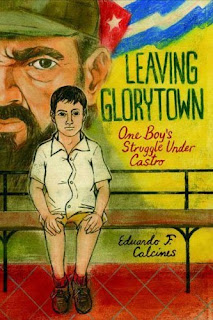In Leaving Glorytown: One Boy's Struggle Under Castro
His memories of Cuba are of Castro’s voice droning on and on over loud speakers, long lines for rationed food, feeling hungry, soldiers taking his dad away in the middle of the night and being humiliated by teachers who called him a “worm” after his parents applied for an exit visa. But his memories also include the song of birds, the sounds of adults playing dominoes on porches at night, the smell of tropical flowers and Cuban coffee, blue water and the movie house.
What I really enjoyed about this book was the realistic dialog between characters, the way the author captures his close relationship with his family, in particular his father, and the ANTICIPATION!!! When will the visa approval telegram arrive???? When will they get to America??? I was left with the impression that these are good people, and that Castro’s loss was America’s gain. And I was reminded of another growing up in a Communist country book I reviewed: Mao and Me.
Ages 12 and up
◊◊◊◊◊
In order to learn more about Castro I picked up a copy of Fidel Castro: Cuban President and Revolutionary
I also learned about the Bay of Pigs, The Cuban Missle Crisis, the Muriel Boat Lift, his relations with other nations and all things Castro. This book would be real asset for anyone working on a research paper.
- His father owned a successful sugar plantation
- His mother was his Dad's housekeeper (they weren’t married, but married later)
- He resisted being controlled by authority figures (hmm, then he became one)
- He was involved in the revolution in Colombia
- He earned a law degree
- He detested the Cuban dictator, Batista, who arrested those who opposed him and strictly controlled the government, press and public opinion (hmm, and then he wound up doing those things)
- He served time in prison for trying to overthrow Batista
- He trained for guerrilla warfare in Mexico
- While hiding in the Sierra Maestra hills after another unsuccessful attempt to over throw Batista’s regime Castro was interviewed by the New York Times.
- Castro’s forces grew and Batista fled to the Dominican Republic
- Castro became Commander in Chief and named Judge Manuel Urrutia Lleo president, but over time eased his way into complete power
- He redistributed land, controlled the press, punished those who opposed him and nationalized private industry
- He had a positive impact on literacy and provided free medical care
Ages 12 and up
◊◊◊◊
Activity: Here is a Castro crossword puzzle.







No comments:
Post a Comment